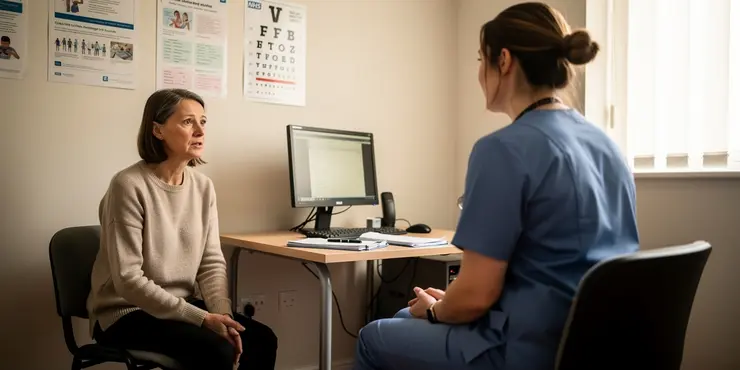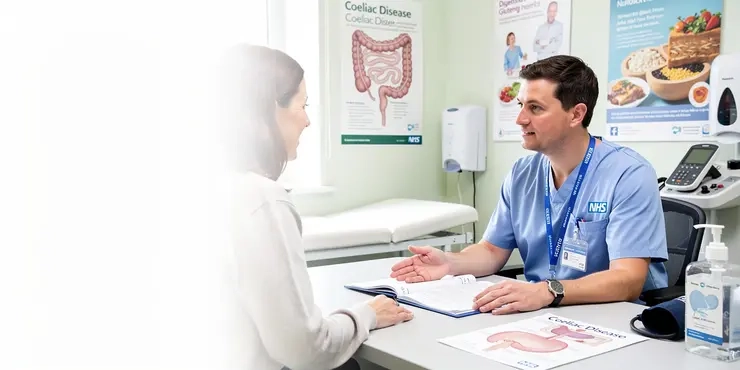Find Help
More Items From Ergsy search
-

What Causes Erectile Dysfunction (ED) - Disease or Symptom - NHS A to Z - Dr Gill
Relevance: 100%
-

What are the symptoms of Marburg virus disease?
Relevance: 49%
-

Symptoms of coeliac disease
Relevance: 41%
-

What are the symptoms of Huntington's disease?
Relevance: 39%
-

What are the symptoms of flesh-eating disease?
Relevance: 39%
-

What are common symptoms of Lyme disease?
Relevance: 37%
-

What are the common symptoms of Crohn's disease?
Relevance: 37%
-

What are the symptoms of sickle cell disease?
Relevance: 36%
-

What are the primary symptoms of motor neurone disease?
Relevance: 35%
-

What are the symptoms of Alzheimer's disease?
Relevance: 35%
-

What is Mitochondrial disease?
Relevance: 35%
-

What symptoms should I watch for if I suspect a mosquito-borne disease?
Relevance: 34%
-

At what age do symptoms of Huntington's disease typically appear?
Relevance: 33%
-

What are the symptoms of BPH?
Relevance: 32%
-

What is the typical progression of Marburg virus disease?
Relevance: 31%
-

What are the side effects of prostate cancer surgery?
Relevance: 31%
-

Coeliac disease
Relevance: 28%
-

What are the symptoms of the bubonic plague?
Relevance: 27%
-

Can Huntington's disease be prevented?
Relevance: 27%
-

Coeliac Disease: Session 1: What is Coeliac Disease?
Relevance: 27%
-

What is Huntington's disease?
Relevance: 26%
-

What is Lyme Disease?
Relevance: 26%
-

Is Huntington's disease fatal?
Relevance: 26%
-
What is Parkinson's disease?
Relevance: 26%
-

Prostate cancer symptoms - detecting them early
Relevance: 26%
-

Lyme disease: What is it?
Relevance: 26%
-

Is there a cure for Crohn's disease?
Relevance: 26%
-

How does surgery treat prostate cancer?
Relevance: 26%
-

Is Crohn's disease contagious?
Relevance: 25%
-

What causes Huntington's disease?
Relevance: 25%
-

What medications are commonly used to treat BPH?
Relevance: 25%
-

Liver disease | NHS
Relevance: 25%
-

Is headache a symptom of a concussion?
Relevance: 25%
-

How is Huntington's disease diagnosed?
Relevance: 25%
-

What is Alzheimer's disease?
Relevance: 25%
-

NHSGGC - What is Coeliac Disease?
Relevance: 25%
-

Can Lyme disease be treated?
Relevance: 25%
-
What are the symptoms of mitochondrial disease?
Relevance: 25%
-

Is flesh-eating disease contagious?
Relevance: 25%
-

How is Crohn's disease diagnosed?
Relevance: 25%
What Causes Erectile Dysfunction (ED) - Disease or Symptom
Introduction to Erectile Dysfunction (ED)
Erectile dysfunction (ED) is a medical condition characterized by the persistent inability to achieve or maintain an erection sufficient for satisfactory sexual performance. It can be a distressing problem, affecting physical and psychological health, and can have a significant impact on relationships and quality of life.Physical Causes of Erectile Dysfunction
Several physical conditions can lead to ED. Cardiovascular diseases, such as hypertension and atherosclerosis, can impede blood flow to the penis. Diabetes is another major cause, often leading to nerve damage and impaired blood supply. Hormonal imbalances, particularly low testosterone levels, and medical conditions like obesity, metabolic syndrome, and chronic kidney disease can also contribute to ED. In some cases, ED can result from side effects of certain medications, such as antidepressants, antihypertensives, and antipsychotics.Psychological Causes of Erectile Dysfunction
Mental health issues, including stress, anxiety, and depression, can significantly affect sexual performance. Performance anxiety or relationship problems can exacerbate ED. Psychological causes often interplay with physical conditions, making it essential to address both aspects during treatment.Lifestyle Factors
Unhealthy lifestyle choices can further increase the risk of developing ED. Smoking, excessive alcohol consumption, and substance abuse can damage blood vessels and impair blood flow to the penis. Leading a sedentary lifestyle and poor diet contribute to conditions like obesity and cardiovascular diseases, which are closely linked to ED.Seeking Help and Treatment
If you are experiencing symptoms of ED, it is crucial to consult a healthcare professional for an accurate diagnosis and appropriate treatment. Treatments can include lifestyle changes, medication, psychological therapy, and in some cases, surgical interventions.Conclusion
Erectile dysfunction (ED) can arise from various physical and psychological causes, with lifestyle factors often playing a significant role. Understanding the potential causes and seeking timely medical advice can help manage and treat this condition effectively.What Causes Erectile Dysfunction (ED)
Introduction to Erectile Dysfunction (ED)
Erectile dysfunction, also known as ED, is when a man has trouble getting or keeping an erection. This can make sex difficult. It can also affect how a person feels about themselves and their relationships.
Physical Causes of Erectile Dysfunction
Many body problems can lead to ED. Heart disease and high blood pressure can stop enough blood from reaching the penis. Diabetes can damage nerves and stop blood flow. Not having enough hormones, like testosterone, being very overweight, and having kidney problems can also cause ED. Sometimes, medicines for depression, high blood pressure, and mental health issues can cause ED too.
Psychological Causes of Erectile Dysfunction
Mental health is important for sex. Feeling worried or sad can cause ED. If someone worries about their performance or has relationship problems, it can make ED worse. It's important to take care of both the mind and the body when treating ED.
Lifestyle Factors
The way a person lives can affect ED. Smoking, drinking a lot of alcohol, and using harmful drugs can damage the body. Not moving much and eating unhealthy food can lead to being overweight and having heart problems, which are linked to ED.
Seeking Help and Treatment
If you have ED, talk to a doctor. They can help find out why it is happening and suggest treatments. Treatments might include changing daily habits, taking medicines, or talking to a therapist. Sometimes, surgery is needed.
Conclusion
Many things can cause erectile dysfunction (ED), including physical, mental, and lifestyle factors. Knowing what may cause ED and getting help from a doctor can help treat it.
Frequently Asked Questions
What is erectile dysfunction (ED)?
Erectile dysfunction (ED) is the inability to achieve or maintain an erection sufficient for satisfactory sexual performance. It can be a one-time issue or a recurring problem.
What are the common causes of ED?
Common causes of ED include cardiovascular disease, diabetes, high blood pressure, high cholesterol, obesity, metabolic syndrome, and certain medications. Psychological factors such as stress, anxiety, and depression can also contribute.
Can lifestyle changes improve ED?
Yes, lifestyle changes such as losing weight, exercising regularly, quitting smoking, reducing alcohol consumption, and eating a balanced diet can help improve ED.
Is ED a normal part of aging?
While ED becomes more common as men age, it is not considered a normal part of aging and can often be treated successfully.
Can medications cause ED?
Yes, certain medications can cause ED as a side effect. These include some blood pressure medications, antidepressants, and antipsychotics. Always consult with your doctor if you suspect your medication is affecting your sexual health.
How can cardiovascular health affect ED?
Poor cardiovascular health can lead to reduced blood flow to the penis, making it difficult to achieve an erection. Conditions like atherosclerosis (hardening of the arteries) and high blood pressure are common contributors.
Are there treatments available for ED?
Yes, there are several treatments available for ED including oral medications (such as sildenafil, tadalafil), lifestyle changes, psychosexual therapy, vacuum erection devices, and surgical options like penile implants.
Can psychological factors cause ED?
Yes, psychological factors such as stress, anxiety, depression, and relationship issues can contribute to ED. Psychological counseling and therapy can be effective treatments.
Is ED related to other health conditions?
Yes, ED can be a symptom of underlying health conditions such as diabetes, high blood pressure, and heart disease. Treating these conditions can improve erectile function.
Can ED be a sign of a more serious health issue?
Yes, ED can sometimes be an early warning sign of cardiovascular diseases or other serious health conditions. It is important to consult a healthcare professional for a proper diagnosis and treatment.
How is ED diagnosed?
ED is diagnosed through a combination of patient history, physical examination, and possibly some tests like blood tests, urine tests, and ultrasound to determine the underlying cause.
Can pelvic floor exercises help with ED?
Yes, pelvic floor exercises, also known as Kegel exercises, can strengthen the muscles involved in achieving an erection and improve ED.
Is it safe to buy ED medications online?
It is important to be cautious when buying ED medications online. Only purchase from reputable pharmacies with a prescription from a healthcare professional to avoid counterfeit or dangerous drugs.
Can alcohol consumption affect ED?
Yes, excessive alcohol consumption can lead to ED by affecting blood flow and causing hormonal imbalances. Reducing alcohol intake can improve erectile function.
Should I see a doctor if I have ED?
Yes, it is advisable to see a doctor if you experience ED, as it can be a sign of other health conditions. A healthcare professional can provide a proper diagnosis and recommend appropriate treatment.
What is erectile dysfunction (ED)?
Erectile dysfunction (ED) means a man has trouble getting or keeping his penis hard. This can make it hard to have sex. It is sometimes called 'impotence'.
If you have questions, you can talk to a doctor, nurse, or a trusted adult. Reading together with someone you trust can help too.
Erectile dysfunction, or ED, is when a man cannot keep his penis hard enough for sex. It might happen only once or it could happen more often.
What makes it hard for men to get 'hard'?
There are many reasons someone might have trouble getting or keeping an erection. Some common reasons are heart problems, diabetes, high blood pressure, and being overweight. Some medicines can also cause this problem. Feeling very worried, sad, or stressed can make it hard too.
Can changing how you live help with ED?
ED means trouble having or keeping an erection. Some changes in how you live can help:
- Eat Healthy: Eating fruits, veggies, and whole grains is good for you.
- Exercise: Moving your body helps your heart and blood flow.
- Stop Smoking: Smoking is bad for your health.
- Limit Alcohol: Don't drink too much alcohol.
- Reduce Stress: Being calm and happy is important.
Tools to Help:
- Ask a doctor or nurse for advice.
- Use apps or videos for exercise ideas.
- Join a support group to talk with others.
Yes, changing some habits can help if you have trouble with erections. These habits include losing weight, exercising often, stopping smoking, drinking less alcohol, and eating healthy foods.
Does ED happen because you get older?
As men get older, it is more common for them to have problems with erections. But it is not something that has to happen just because you are getting older. Many times, doctors can help fix it.
Can medicine make it hard to get an erection?
Yes, some medicines can make it hard to get an erection. These medicines include some that help with blood pressure, feeling sad (antidepressants), and some for mental health (antipsychotics). If you think your medicine is causing problems, talk to your doctor. They can help you.
How does heart health affect erections?
Your heart helps pump blood around your body. This is important for getting erections. If your heart is not healthy, it can be hard to get an erection.
Here are some things that can help:
- Eat healthy foods like fruits and vegetables.
- Exercise regularly, like walking or playing outside.
- Visit your doctor to check your heart health.
If your heart is not healthy, it can make it hard for blood to flow to the penis. This can make it hard to get an erection. Problems like stiff arteries and high blood pressure can cause this.
Can you get help for ED?
Yes, there are different ways to help with ED. You can take pills like sildenafil or tadalafil. You can also try changing your habits, talking to a therapist about feelings, using a special pump to help get an erection, or having an operation to get a device put in your body.
Can how we feel in our mind cause problems with getting or keeping an erection?
Yes, things like stress, worry, feeling sad, and problems with relationships can cause ED. Talking to a counselor or therapist can help make it better.
Is ED linked to other health problems?
Yes, having trouble getting or keeping an erection can be a sign of other health problems. These problems might be diabetes, high blood pressure, or heart disease. Getting help for these health problems can make it easier to get an erection.
Can having trouble keeping an erection mean something else is wrong?
Yes, not being able to get or keep an erection can sometimes mean there is a problem with the heart or other health issues. It is good to talk to a doctor to find out what is going on and get help.
How do doctors find out if someone has ED?
Doctors ask questions and do tests to see if someone has ED. They talk to the person to learn more about their health. There are some tests that help doctors understand what's happening in the body. If someone feels shy, they can bring a friend or family member to help during the visit.
Tools like pictures or drawings can also help explain things more clearly. If you have trouble reading, someone can help read and explain it to you. Always ask questions if you don't understand something.
Doctors find out if someone has ED by asking questions, checking their body, and maybe doing some tests. These tests can include blood tests, urine tests, and using an ultrasound to see what is causing the problem.
Can exercises help with erection problems?
Doing exercises for your pelvic floor muscles might help if you have trouble getting or keeping an erection.
These exercises are sometimes called Kegel exercises. They make your muscles stronger.
Ask a doctor or nurse to show you how to do these exercises right. Taking your time to learn can be very helpful.
Try using apps or videos to guide you, and remember to be patient with yourself.
Yes, pelvic floor exercises, called Kegel exercises, can make the muscles stronger. These muscles help men get an erection. Doing these exercises can make it easier to get erections.
Can I buy ED medicine online safely?
ED means 'erectile dysfunction'. This is when someone has trouble getting or keeping an erection.
If you want to buy ED medicine online, you need to be careful. Here are some tips to stay safe:
- Talk to your doctor first. They can tell you what medicine is right for you.
- Use websites you know and trust. Look for a pharmacy that is real and has a good reputation.
- Check if the website asks for a prescription. This means they want to make sure a doctor said you need the medicine.
- Never buy from a website that says "no prescription needed." This can be dangerous.
- Ask a trusted adult or family member for help if you are unsure.
Remember, staying safe online is very important!
Be careful when buying medicine for ED (erectile dysfunction) on the internet. Always buy from trusted pharmacies. Make sure you have a doctor's prescription. This will help you stay away from fake or harmful medicine.
Can drinking alcohol cause problems with erections?
Drinking too much alcohol can sometimes make it hard to get or keep an erection. An erection is when the penis is hard. This can happen because alcohol affects the body and brain in ways that make it difficult for the penis to work properly.
Here are some things that can help:
- Drink less alcohol.
- Talk to a doctor if you have problems with erections often.
- Use tools like pictures or simple charts to understand more about alcohol and erections.
Drinking too much alcohol can make it hard to get or keep an erection. This is because it affects how blood moves in your body and changes your hormones. Drinking less alcohol can help you get better erections.
Should I see a doctor if I have trouble getting an erection?
If you have trouble getting an erection, it can be a good idea to see a doctor. They can help you find out why this is happening.
Here are some things that might help you:
- Talk with someone you trust about how you feel.
- Keep a list of any questions you want to ask the doctor.
- Use pictures or drawings to explain what is happening.
- Bring a friend or family member for support during the visit.
If you have trouble getting or keeping an erection, it's a good idea to see a doctor. It might mean something is wrong with your health. A doctor can help find out what the problem is and suggest how to make it better.
Useful Links
This website offers general information and is not a substitute for professional advice.
Always seek guidance from qualified professionals.
If you have any medical concerns or need urgent help, contact a healthcare professional or emergency services immediately.
Some of this content was generated with AI assistance. We’ve done our best to keep it accurate, helpful, and human-friendly.
- Ergsy carfully checks the information in the videos we provide here.
- Videos shown by Youtube after a video has completed, have NOT been reviewed by ERGSY.
- To view, click the arrow in centre of video.
- Most of the videos you find here will have subtitles and/or closed captions available.
- You may need to turn these on, and choose your preferred language.
- Go to the video you'd like to watch.
- If closed captions (CC) are available, settings will be visible on the bottom right of the video player.
- To turn on Captions, click settings .
- To turn off Captions, click settings again.
More Items From Ergsy search
-

What Causes Erectile Dysfunction (ED) - Disease or Symptom - NHS A to Z - Dr Gill
Relevance: 100%
-

What are the symptoms of Marburg virus disease?
Relevance: 49%
-

Symptoms of coeliac disease
Relevance: 41%
-

What are the symptoms of Huntington's disease?
Relevance: 39%
-

What are the symptoms of flesh-eating disease?
Relevance: 39%
-

What are common symptoms of Lyme disease?
Relevance: 37%
-

What are the common symptoms of Crohn's disease?
Relevance: 37%
-

What are the symptoms of sickle cell disease?
Relevance: 36%
-

What are the primary symptoms of motor neurone disease?
Relevance: 35%
-

What are the symptoms of Alzheimer's disease?
Relevance: 35%
-

What is Mitochondrial disease?
Relevance: 35%
-

What symptoms should I watch for if I suspect a mosquito-borne disease?
Relevance: 34%
-

At what age do symptoms of Huntington's disease typically appear?
Relevance: 33%
-

What are the symptoms of BPH?
Relevance: 32%
-

What is the typical progression of Marburg virus disease?
Relevance: 31%
-

What are the side effects of prostate cancer surgery?
Relevance: 31%
-

Coeliac disease
Relevance: 28%
-

What are the symptoms of the bubonic plague?
Relevance: 27%
-

Can Huntington's disease be prevented?
Relevance: 27%
-

Coeliac Disease: Session 1: What is Coeliac Disease?
Relevance: 27%
-

What is Huntington's disease?
Relevance: 26%
-

What is Lyme Disease?
Relevance: 26%
-

Is Huntington's disease fatal?
Relevance: 26%
-
What is Parkinson's disease?
Relevance: 26%
-

Prostate cancer symptoms - detecting them early
Relevance: 26%
-

Lyme disease: What is it?
Relevance: 26%
-

Is there a cure for Crohn's disease?
Relevance: 26%
-

How does surgery treat prostate cancer?
Relevance: 26%
-

Is Crohn's disease contagious?
Relevance: 25%
-

What causes Huntington's disease?
Relevance: 25%
-

What medications are commonly used to treat BPH?
Relevance: 25%
-

Liver disease | NHS
Relevance: 25%
-

Is headache a symptom of a concussion?
Relevance: 25%
-

How is Huntington's disease diagnosed?
Relevance: 25%
-

What is Alzheimer's disease?
Relevance: 25%
-

NHSGGC - What is Coeliac Disease?
Relevance: 25%
-

Can Lyme disease be treated?
Relevance: 25%
-
What are the symptoms of mitochondrial disease?
Relevance: 25%
-

Is flesh-eating disease contagious?
Relevance: 25%
-

How is Crohn's disease diagnosed?
Relevance: 25%


